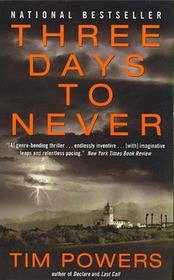As with all Powers' novels, there's a lot going on. Frank (the younger), Daphne, Charlotte, and Lepidopt are all sympathetic characters, there's some who are there for filler, some who are villainous, and some who just show up at the last moment (Canino? really?). Not sure why the head was there, although one mystery was solved because of it; and I'm not entirely sure what the Vespers crowd really wanted with the machine. The revelation of Einstein's big mistake was chilling. Liked all the supernatural imagery. All in all, pretty good but I won't feel a need to read it again.
I tried to get involved & keep reading this book. I am not a fan of history, true or made up. I did want to read a psychic sory, but not this kind. If you want both this might be for you. My first from this authore, but have no desire for any others.
Tim Powers is possibly the most difficult of American writers to classify. A disciple of the late Phillip K Dick, of Blade Runner/Do Androids Dream Of Electric Sheep fame, Powers various works range from dystopian futures to the most original take on vampire legends in the past 100 years. His characters are, for the most part, neither barbarian heroes nor fantasy creatures, but instead are the denizens of nightmares and hard boiled fantasies, gamblers, mental patients, and yes, ordinary people in extraordinary circumstances.
This book involves elements as diverse as time travel and the interaction of father with daughter, from the regrets of choices gone bad to the hope that somehow things will work out in the end, from Jungian archetypes and Albert Einstein to Cabala and the Mossad. Always readable, sometimes disturbing, worth the effort, Powers is, in the end, a magical realist of world class talent who remains woefully underknown.
As a side note, if you enjoy Powers' works, please check out James Blaylock, the flip side to the Powers' coin. The works of both men are interlocked in so many ways that it pays to read them together to illuminate the more obscure of the ideas being presented.




